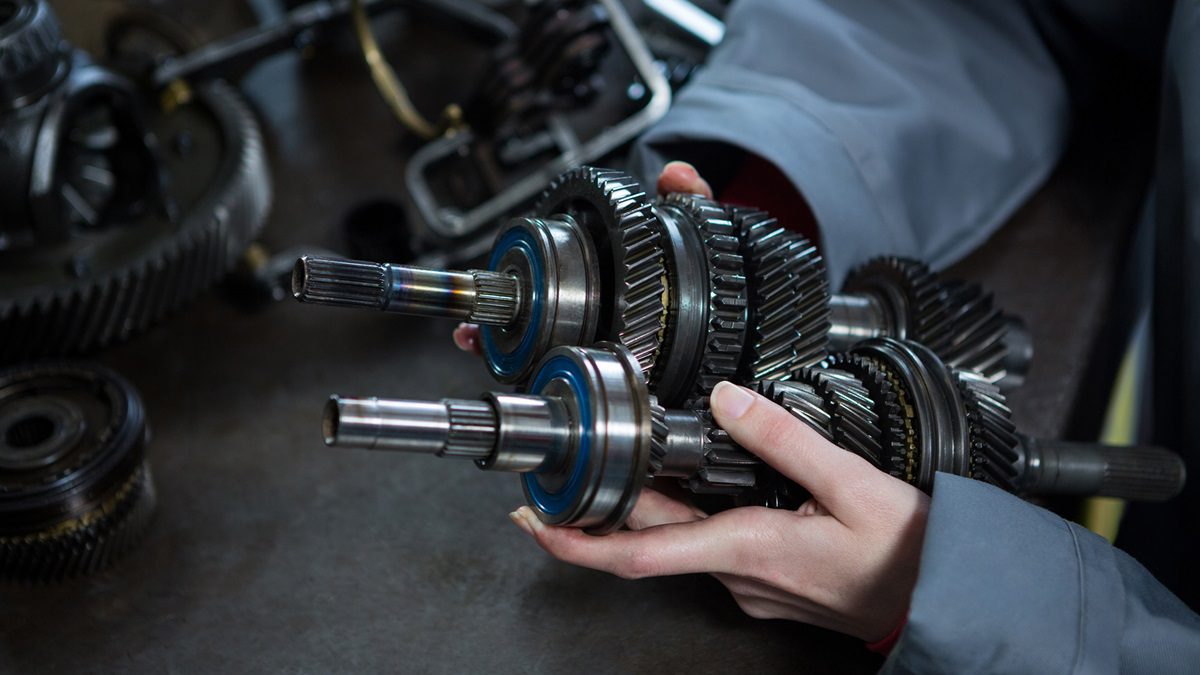Common Mercedes-Benz Transmission Problems & Solutions


One of the most common concerns among owners is Mercedes-Benz transmission problems. If you are an owner of a Mercedes-Benz, you’ve probably experienced shifting issues or noticed warning signs. These issues can range from minor sensor malfunctions to complete transmission failure.
Ignoring transmission problems can lead to costly Mercedes-Benz transmission repair and even safety hazards. It’s essential to recognize the signs early. Below, we’ll explore the most frequent transmission problems and practical solutions to keep your Mercedes running smoothly.
Why Is My Mercedes-Benz Transmission Slipping?
A slipping transmission in a Mercedes-Benz can result from several issues, including low transmission fluid, worn-out clutch packs, or faulty solenoids. When this happens, you may notice delayed acceleration, erratic gear shifts, or an overall loss of power. Here are the causes of transmission slipping,
- Low or Contaminated Transmission Fluid – Dirty or insufficient fluid reduces lubrication and causes the gears to slip.
- Worn Clutch Plates – Over time, friction causes wear, leading to inefficient power transfer.
- Malfunctioning Solenoids – These electronic components regulate fluid pressure and may fail over time.
- Torque Converter Issues – A faulty torque converter can prevent smooth engagement between the engine and transmission.
Solutions for Transmission Slipping
- Check Fluid Levels – If low, top it off with the manufacturer-recommended fluid. If dirty, consider a full flush.
- Inspect and Replace Clutch Components – If worn, replacing the clutch pack can restore proper function.
- Test and Replace Faulty Solenoids – A diagnostic scan can reveal failing solenoids that need replacement.
- Service the Torque Converter – If defective, a mechanic may recommend repair or replacement.
Ignoring transmission slipping can lead to complete transmission failure, making early detection and maintenance essential.
What Are the Signs of a Failing Mercedes-Benz Transmission?
Recognizing Mercedes-Benz transmission problems early can save you from expensive repairs. A failing transmission often shows noticeable warning signs that indicate it needs attention.
- Rough or Delayed Shifting – If gears take longer to engage or shift abruptly, it could indicate internal damage.
- Transmission Fluid Leaks – Puddles of red or brown fluid under your car signal a leaking gasket or seal.
- Unusual Noises – Whining, grinding, or clunking sounds when shifting are common warning signs.
- Check Engine Light – The onboard diagnostics system can detect transmission issues and trigger the warning light.
- Burning Smell – Overheated transmission fluid can produce a burnt odor, indicating severe internal wear.
How to Address Transmission Issues
- Get a Professional Diagnosis – A mechanic can run a computer scan to pinpoint issues.
- Inspect Transmission Mounts – Weak mounts can lead to excessive vibrations and misalignment.
- Replace Worn Components – Timely replacements of gaskets, filters, and fluids can prevent further damage.
- Schedule Routine Maintenance – Regular servicing helps extend the lifespan of your transmission.
Addressing these problems early can prevent more severe damage and costly Mercedes-Benz transmission repairs.
Common Causes of Mercedes-Benz Transmission Problems
Like any high-performance vehicle, Mercedes-Benz transmissions require proper care to function correctly. However, several factors can lead to Mercedes-Benz transmission problems, causing poor shifting, overheating, or even complete failure. Understanding these causes can help prevent expensive Mercedes-Benz transmission repairs.
- Low or Old Transmission Fluid – Mercedes-Benz transmissions rely on high-quality, clean fluid to operate smoothly. Dirty or insufficient fluid can cause rough shifting, overheating, and slipping.
- Worn-Out Transmission Components – Over time, internal parts like clutch packs, solenoids, and seals degrade, leading to performance issues.
- Electronic Control Module (ECM) Malfunctions – The ECM manages gear shifting electronically. If faulty, it can cause erratic shifting, limp mode activation, or transmission failure.
- Torque Converter Issues – The torque converter transfers power from the engine to the transmission. A failing torque converter can lead to slipping and overheating.
- Software Glitches – Modern Mercedes-Benz vehicles rely on complex software for transmission control. A malfunctioning software update or programming error can disrupt shifting performance.
How to Prevent Transmission Failure
- Check and Change Transmission Fluid Regularly – Follow the manufacturer’s maintenance schedule to avoid fluid degradation.
- Get Software Updates When Recommended – Keeping your vehicle’s software up to date ensures smooth operation.
- Schedule Routine Inspections – A certified technician can catch minor issues before they turn into costly repairs.
- Avoid Aggressive Driving – Rapid acceleration and abrupt braking put excessive strain on the transmission.
Ignoring early signs of Mercedes-Benz transmission problems can lead to costly repairs or full transmission replacement.
Most Frequent Mercedes-Benz Transmission Error Codes
Modern Mercedes-Benz vehicles come equipped with an onboard diagnostic system that logs error codes when transmission issues arise. These codes help mechanics pinpoint specific problems.
- P0715 – Input/Turbine Speed Sensor Malfunction – This code indicates a faulty speed sensor, leading to poor shifting.
- P0730 – Incorrect Gear Ratio – The transmission isn’t shifting correctly, possibly due to worn clutch plates or low fluid.
- P2767 – Torque Converter Clutch Circuit High – This code signals an issue with the torque converter, which can cause slipping.
- P0894 – Transmission Component Slipping – Internal wear and tear can cause this issue, requiring immediate attention.
- P0700 – Transmission Control System Malfunction – A general warning that something is wrong with the transmission system.
How to Fix Transmission Error Codes
- Run a Diagnostic Scan – A professional scan can confirm the issue before replacing any parts.
- Inspect and Replace Faulty Sensors – Malfunctioning sensors should be swapped out to restore proper shifting.
- Flush or Replace Transmission Fluid – Contaminated fluid can cause shifting issues and should be replaced as per manufacturer recommendations.
- Repair or Replace the Torque Converter – If a faulty torque converter is causing slipping, repair or replacement is necessary.
Error codes are an early warning sign of Mercedes-Benz transmission problems, so addressing them promptly can prevent bigger issues down the road.
How to Fix Common Mercedes-Benz Transmission Problems
When dealing with Mercedes-Benz transmission problems, timely repairs and proper maintenance can make a significant difference. Ignoring small issues can lead to expensive repairs, but taking the right steps can keep your transmission in top shape. Follow these steps to fix transmission issues
- Check the Transmission Fluid – Low or contaminated fluid is one of the leading causes of transmission problems. Ensure the fluid is at the correct level and clean. If the fluid appears dark or burnt, a full flush may be necessary.
- Reset the Transmission Adaptations – Mercedes-Benz vehicles have adaptive transmissions that learn driving habits. Resetting these adaptations can sometimes resolve shifting issues.
- Inspect for Leaks – Transmission fluid leaks can lead to overheating and internal damage. Check for leaks near the pan, seals, and transmission lines.
- Replace Faulty Sensors or Solenoids – Electronic components control shifting, and a faulty solenoid or sensor can cause transmission failure. Replacing these components can often resolve shifting problems.
- Update the Transmission Software – Some transmission issues are caused by outdated software. A software update at a certified service center can improve shifting performance.
- Address Torque Converter Issues – A failing torque converter can cause slipping and overheating. If faulty, it may need replacement.
By addressing these common problems early, Mercedes-Benz owners can avoid costly repairs and extend the lifespan of their transmissions.
Signs Your Mercedes-Benz Needs a Transmission Replacement
Sometimes, repairs aren’t enough, and a full transmission replacement becomes necessary. Knowing when to replace your transmission can save you from repeated breakdowns and high repair costs.
Signs That Indicate Transmission Replacement Is Needed
- Metal Shavings in Transmission Fluid – If the transmission fluid contains metal debris, internal components are severely worn.
- Complete Loss of Gears – If the transmission won’t engage any gears, the internal damage may be beyond repair.
- Repeated Overheating – Frequent overheating indicates extensive wear or a failing cooling system.
- Constant Slipping and Erratic Shifting – If repairs haven’t resolved slipping issues, the entire transmission may need replacement.
- Limp Mode Activation – If the vehicle frequently enters limp mode, even after repairs, a replacement might be necessary.
Replacing a transmission is expensive, so getting a professional diagnosis is crucial before making a decision.
Preventing Mercedes-Benz Transmission Problems
Prevention is always better than costly repairs. By maintaining your transmission properly, you can avoid many common Mercedes-Benz transmission problems.
- Follow the Manufacturer’s Maintenance Schedule – Regular servicing keeps your transmission in good condition.
- Use the Correct Transmission Fluid – Always use manufacturer-recommended transmission fluid to prevent damage.
- Avoid Heavy Towing or Aggressive Driving – Excessive strain on the transmission leads to premature wear.
- Get Regular Software Updates – Modern Mercedes-Benz vehicles rely on transmission software for smooth shifting. Updates improve performance.
- Have Your Transmission Inspected Annually – Routine inspections help catch small issues before they turn into major problems.
Taking preventive measures helps Mercedes-Benz owners enjoy smooth performance and avoid expensive transmission repairs.
Get Help for Mercedes-Benz Transmission Problems
Ignoring Mercedes-Benz transmission problems can lead to severe damage and costly repairs. Paying attention to warning signs, performing regular maintenance, and getting professional inspections can help keep your transmission running smoothly.
Contact HEART Auto Care for expert transmission diagnostics, maintenance, and Mercedes-Benz transmission repairs. For any Mercedes-Benz transmission problems, visit HEART Auto Care to schedule an appointment today.










